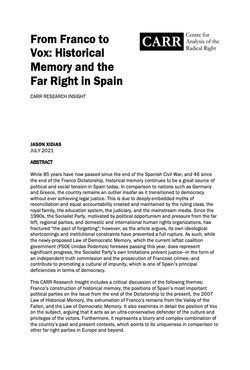By Jason Xidias
In the past two years, Spain’s far-right party Vox has gone from no representation in the Spanish parliament to 52 seats, making it the third most representative political force nationally behind the People’s Party (PP) and the Socialist Party (PSOE). This has radically transformed Spanish politics, leading to a level of polarization not seen since the Spanish Second Republic (1931-9). Until Vox’s recent electoral success, Spain was considered immune to the far right because of its Francoist past and relatively favorable attitude toward globalization, the EU, and immigration. However, as this article shows, Franco has never completely gone away—Vox is both a modernized version of Spain’s ultraconservative past and a condition and manifestation of international neoliberal and authoritarian trends. The article analyzes Vox’s ideological roots, emergence, political program, voter base, and influence in Spanish politics in relation to key events—notably the Great Recession, the success of far-left party Podemos, corruption scandals in mainstream politics, and Catalonia’s pursuit of independence—and speculates about the party’s future against the backdrop of COVID-19.
London, UK: Centre for Analysis of the Radical Right, 2020. 23p.



